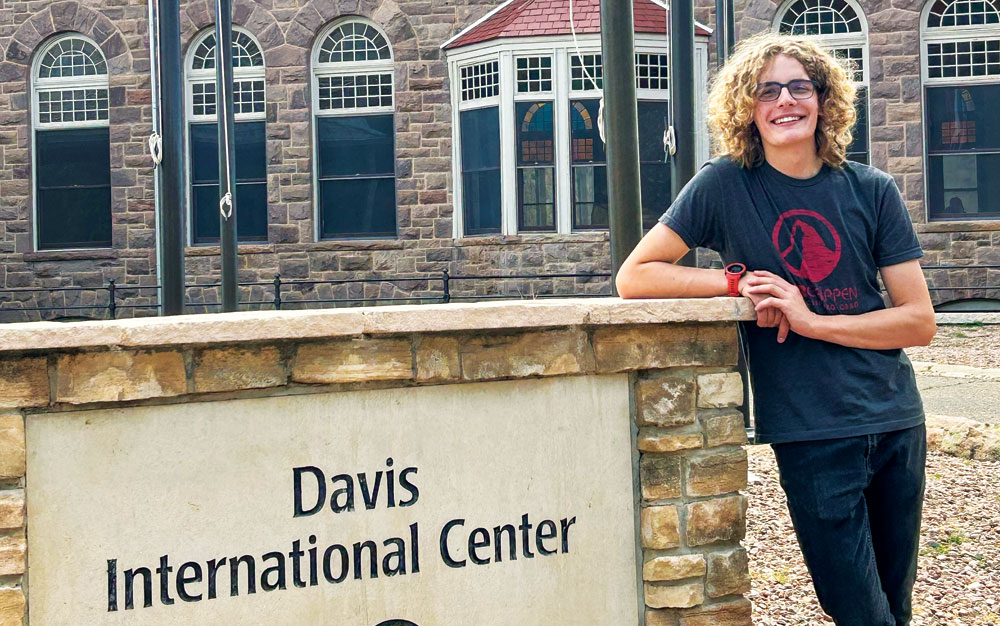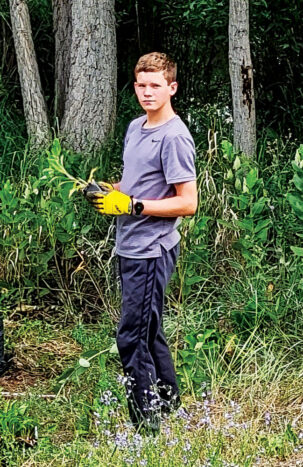
Ben Wagner is settling into life at UWC in New Mexico, which was established in 1982 as the Armand Hammer United World College of the American West by Armand Hammer. Prince Charles was its president. Photo courtesy of the Wagner family
This summer’s national and international headlines have included a steady stream of stories centered on extreme climate events—excessively high temperatures, more frequent cyclones, more intense hurricanes, and a host of environmental disasters from droughts to wildfires that have all been intensified by climate change.
In the case of Maui’s recent wildfires, for example, experts say that invasive grasses and 80-mph winds combined with warmer ocean waters to exacerbate the fires that devastated the town of Lahaina. In a Los Angeles Times interview, Hiroyuki Murakami—a project scientist at the National Oceanic and Atmospheric Administration’s Geophysical Fluid Dynamics Laboratory—explained that lower ocean temperatures typically cool cyclone winds but that the rising ocean temperatures prevented this from happening in Hawaii.
If you read only these stories, the outlook is bleak.
As the burden of climate change will increasingly fall on our youth, Front Porch features two local students taking different approaches to some of the environmental challenges before us.
Ben Wagner
“I was born into the climate crisis. I wasn’t given a choice,” says former Northfield High School student Ben Wagner, 17. The senior just relocated to Montezuma, New Mexico to finish his secondary education at United World College (UWC), a two-year internationally focused program that envisions a more peaceful and sustainable future. The Montezuma campus is home to 235 students, only about a quarter of whom are from the U.S., making Wagner’s participation exceptional. UWC features a program of coursework that includes emphases on community service, wilderness exploration, and conflict resolution.
Wagner is committed to exploring sustainability at UWC, where the surrounding natural landscape serves as a classroom. “The ideals of UWC have always aligned with mine,” says Wagner, who learned about the program through a family member. Wagner understands that many teens see a car as a symbol of freedom, but he has long advocated—at City Council meetings and elsewhere—for greater access to bicycles and bike lanes as a sustainable solution to transportation challenges.
Wagner advises other young people to seek opportunities to take their education in a unique and purposeful direction as he is: “Don’t feel like you have to follow the traditional school pathway,” he says.

Luke Nortman stops for a photo while actively planting during his second project, which sought to reduce soil salinity. Photo provided by Luke Nortman
Luke Nortman
Luke Nortman, 17, a George Washington High School student and Central Park resident, has long pursued his passion for environmentalism outside of the classroom. Nortman works within the traditional education system while carving out a project-based learning path that has him in the running for a Distinguished Conservation Service Award from Boy Scouts of America.
Nortman’s conservation work began in ninth grade, when he reached out to the Denver Parks and Recreation Department (DPR) to restore native habitats in Central Park’s Greenway, hoping to attract native bat species to the area. Bats consume primarily mosquitoes and other small insects, but the bat house in the Greenway looked dilapidated and seemed to have no bat activity.
Over a two-year period, Nortman researched native Colorado bat species (there are 19 across the state’s diverse ecosystems), as well as the fauna needed to attract them. DPR grew over 600 plants in its greenhouse for his bat project, and Nortman raised funds and recruited volunteers to assist his endeavor of cultivating the plants along the Greenway. He replaced the forlorn bat house, and returns periodically to try to monitor the project’s success. Although he has not yet had any bat sightings, he believes that over time, the healthy ecosystem will attract bats to the house.
This past year, Nortman implemented another project to understand why the area’s cottonwoods are losing their leaves prematurely. Soil samples detected high salinity around the trees. Working off the theory that road salt runoff in the winter has caused the cottonwood leaves to brown and die sooner than they should, he planted salt-tolerant plants around a group of cottonwoods near the skate park to help absorb the salt.
“Changes happen all the time,” he says, and notes that these projects have taught him a lot of skills—such as leadership and flexibility—which he hopes will serve him well.
Nortman encourages youths to find what is meaningful to them and pursue those paths. He also appreciates the power of one, and wants kids to know “that even if you are young, you are able to reach out and have an impact.” He is considering applying to both Massachusetts Institute of Technology and California Institute of Technology so he can further his education after graduation.
Both young men acknowledge the Denver Public Schools classes that impacted their understanding of the world and passion for the environment. Nortman credits an Environmental Systems class and Wagner an AP Human Geography class taught by Constance Jandegian, with both students crediting their classes for providing tools and information that were formative to their respective areas of interest. “You can’t solve problems just by talking about them,” says Wagner, “you have to take action.”



0 Comments